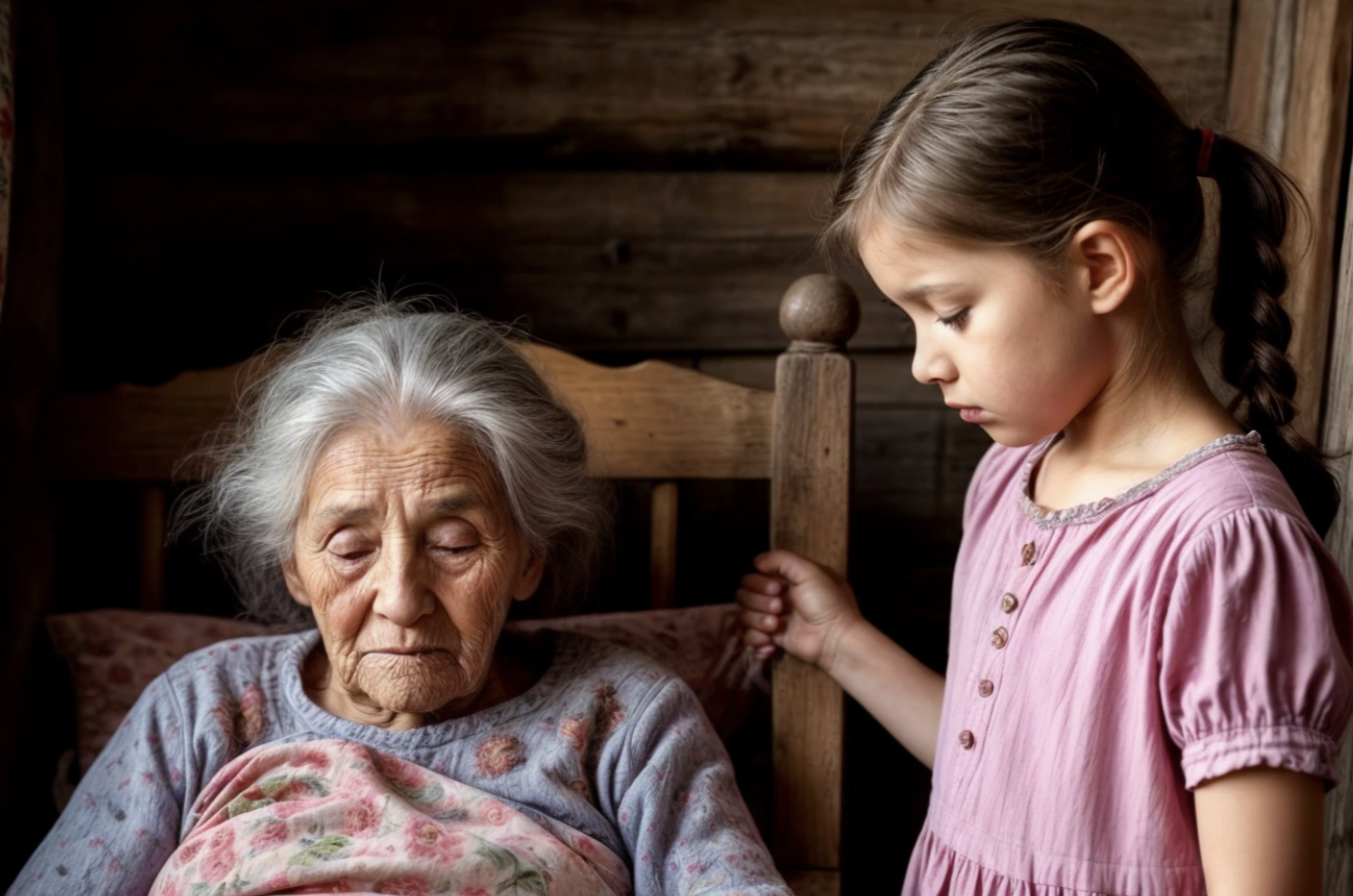In the middle of the school year, a new student appeared when everyone had long since gotten used to each other. Nobody knew where she had come from, and few cared enough to ask. Her name was Masha — a thin girl with narrow shoulders and huge eyes filled with anxious anticipation. On her feet were worn-out slippers that had clearly seen a lot in their time. Instead of a regular backpack, she carried a knitted pouch with string straps.
The teachers immediately noticed her modesty: she spoke quietly, tried not to stand out, and avoided participating in school conversations. But in a group of children, even the smallest difference can be enough to become a target for ridicule.
The local boys would sneak glances at her and snicker as they passed by. They laughed at her slippers and mocked her, saying, “Look, she doesn’t even have a normal backpack.” The girls, slyer, pretended to be friendly, but the moment Masha turned away, whispering and giggling erupted at the back desks, accompanied by sidelong glances.
No one knew what story lay behind this fragile girl, why she flinched so often. The teachers noticed she didn’t fit in, but most just shrugged it off: “Well… she’s new, she’ll get used to it. She’ll adapt somehow.” Occasionally, a teacher would try to talk to her, ask how she was doing, but she would respond briefly, as if afraid to reveal too much.
Every day after school, avoiding contact with her classmates, Masha would quickly gather her notebooks, slip on her old slippers, and leave. Before long, it became obvious that she was heading toward the large pond at the edge of the settlement. Ducks lived there, and each time she would pull a packet of crumbs or grains from her pocket. She would sit on a wooden bench, quietly call the birds over, and they would swim up to her, as if sensing her trust. She would feed them, whispering something — maybe talking to the ducks or simply seeking comfort in that peaceful place.
Weeks passed: winter was ending, the ice on the pond was melting, and the ducks were gathering in flocks, waddling across the wet grass. And every day, Masha came to them with her humble offering.
One day, two boys from her class decided to prank the “strange” girl. They thought her silence was an invitation for “fun.”
They came up with the idea of tossing a rubber snake into the pond while she was feeding the ducks. One afternoon, they lay in wait. As usual, she walked down the path, sat on the bench, and pulled out her bag of crumbs. The boys hid in the bushes, preparing their “joke,” waiting for the right moment to throw the snake so it would surface near the shore, right in front of her.
Masha crumbled the bread and tossed it to the ducks. They quacked and paddled closer. At one point, one of the boys hurled the rubber snake into the water. It looked fairly realistic at a glance — green, patterned, long, and writhing.
When Masha noticed it, she didn’t immediately understand what it was. It seemed like some creature — long, slithering — was swimming toward her.
At first, she gasped in surprise, then was seized by panic. Perhaps she had once encountered a real viper, or maybe she was simply terrified of the unknown. She jumped up, stumbled, slipped on the wet grass, and with a scream, fell into the water. Her bag of crumbs dropped to the ground, and she plunged into the icy ripples.
The boys hiding in the bushes were stunned — they hadn’t expected things to go that far. They rushed along the bank, not knowing what to do.
Masha flailed, trying to grab onto a branch sticking out over the water. Her wet hair clung to her face; she screamed — from fear, maybe pain. The water was freezing, and her strength was fading fast. The more terrified she became, the more she choked on the icy water.
At that moment, Yegor from a parallel class happened to be passing by. His parents had sent him to visit his aunt, who lived by the river. He noticed the commotion and saw Masha, almost submerged. Without thinking, he stripped off his outer clothing and dove into the pond. Fueled by adrenaline, he barely felt the cold.
He swam — he could swim a little — and quickly reached her, grabbing her under the arms. The filthy, freezing water didn’t stop him: he dragged her to the shore.
Someone from the gathering crowd thought to hand them a stick to grab onto.
They finally made it out: trembling, pale Masha, and soaked, shivering Yegor, coughing and gasping for breath.
As the others regained their senses, the girl sat huddled on the ground, tears in her eyes, not understanding what had happened, why there had been a snake in the pond, or who was to blame.
The boys who had started it all quickly slunk away, hanging their heads in shame.
The others stood around awkwardly, glancing from Masha to Yegor.
Someone suggested, “We should walk her home — she’s soaking wet.”
But Masha shook her head: “No, I’ll manage…”
She got up, grabbed her backpack, and looked at Yegor. He stood there in wet pants, barely able to stay upright from the cold.
She mustered her courage and whispered, “Thank you. Sorry…”
He just shrugged: “What are you apologizing for? Less talking, let’s go, or we’ll both catch cold.”
They started walking along the narrow path by the pond.
Masha shivered and sniffled; Yegor walked beside her, biting his lip — whether from the cold or from confusion.
He glanced back at their schoolmates, but they had scattered.
He was left to accompany her alone.
After a minute of awkward silence, he asked, “Where should I walk you to? I don’t want to leave you like this.”
Masha looked at him, thought for a moment, and nodded toward an old alley: “That way. I live nearby, not far…”
They turned down a side path.
Along the way, Yegor briefly explained how he was on his way to his aunt when he saw her drowning.
Masha shrank with shame and fear — what if those boys now sought revenge because she had been rescued?
But Yegor’s gaze was calm.
When they reached the battered wooden fence at the end of the street, Masha quietly said, “Thanks again. You should go home before you get sick.”
He nodded and was about to leave when he noticed the house she entered looked abandoned.
The windows seemed boarded up, old rags hung from the porch.
“Is this your house?” he blurted out.
Masha nodded, trying to slip inside.
But he stepped forward: “Maybe you need help? You’re soaking wet!”
She hesitated, then quietly opened the door and let him in.
Inside the tiny entryway, the air was dim and smelled of medicine and something old and dusty.
Yegor immediately noticed a little boy, about five years old, peeking out from a room with wide, silent eyes.
He seemed to want to ask something but stayed quiet.
Masha took off her wet sweater, tossed it onto a chair, and turned to Yegor:
“This is my brother, Grisha.”
The little boy shifted his gaze between his sister and the unfamiliar boy.
Masha added, “He doesn’t go to kindergarten because… well, there’s no one to take him. Our grandma lives with us, but she… she can’t get up.”
Yegor glanced into the room and saw an elderly woman lying on a worn-out sofa.
She seemed paralyzed, her gaze fixed on the ceiling, her head barely moving.
“Hello,” he said quietly, unsure if she could hear him.
The old woman weakly moved her lips.
Masha led him to a small kitchen.
There was no gas stove — only an old electric one, and the refrigerator looked ancient, probably long broken.
In the corner stood two or three plastic buckets, probably for water, since there was no plumbing left in the house.
“Sorry, it’s not great here… I don’t usually bring strangers home,” Masha said shyly.
Yegor said nothing, feeling a heavy weight in his chest.
It became clear: this girl lived on the brink of survival.
Her parents were gone or had long abandoned them, her grandmother was bedridden, and her little brother too young to fend for himself.
And she, wearing worn slippers, trudged to school every day, scared to utter a word.
He looked at her and simply asked:
“Do you have anything dry to change into?”
Masha lowered her eyes. “Yes, there’s something wrong with the room. I’ve gotten used to it… It’s nothing serious, just some things got wet.” But Yegor, though only thirteen years old, suddenly felt a strong urge to help. He knew there wasn’t much he could do, but leaving everything as it was felt like betraying the courage he’d shown by the pond. He asked, “Can I come by tomorrow? If you don’t mind. I could bring some food. My mom often makes extra soup — maybe it could help you and your brother?”
The girl turned pale and looked up. “But we’re not begging for charity, we can manage ourselves…”
“It’s not charity,” Yegor interrupted. “It’s just a friendly gesture. We’re friends now… right?”
She shrugged uncertainly but didn’t argue. Deep down, she probably understood that surviving was hard. Every week, she received a small disability allowance for her grandmother, but it barely covered the basics — there was no way to afford new shoes or warm clothes. So there she stood, in wet socks, trying to hide her joy that someone cared enough to offer help.
Yegor stayed a bit longer, chatting with Grisha. The little boy was shy but smiled when he heard about school recess and the cafeteria. Their grandmother lay coughing weakly in the other room. Masha went to her, adjusted her pillow, moistened her lips with a sponge, and then returned to the kitchen.
When Yegor finally left, Masha walked him to the door, her eyes full of gratitude. “Thank you again. For saving me… and everything else.”
Yegor nodded. “Alright, see you tomorrow.”
At home, Yegor was immediately scolded by his mother for his wet clothes.
“Did you fall into the pond? What were you thinking? You could have caught a cold!”
At first, he stayed silent, but then he spilled everything — about the new girl everyone bullied, how she nearly drowned, and about her life in a half-ruined house with her sick grandmother and little brother. As he talked, tears threatened to fall; the injustice of it all was overwhelming.
His mother, a kind-hearted woman, calmed down quickly and asked, “She’s just a child — why isn’t anyone helping? Where are her parents?”
“They’re gone,” he muttered.
“What happened? Did they abandon her?”
“I don’t know. She doesn’t talk about it. But tomorrow, I want to bring them lunch — is that okay?”
His mother stroked his hair and sighed. “You’re a good boy… Of course, it’s okay. We should think of more ways to help — maybe some clothes or shoes…”
Yegor nodded. “As long as she accepts it. She’s proud.”
The next day after school, Yegor arrived at Masha’s house carrying a pot of soup wrapped in a towel to keep it warm.
Masha looked like she couldn’t believe he had really come. But she let him in and led him to the kitchen, blushing slightly as she apologized for the lack of proper dishes — only some old bowls and spoons.
Yegor ladled out the hot soup, and Grisha eagerly dug in, probably unused to anything warm besides the thin porridge Masha cooked with water.
Yegor’s mother had also sent bread, and they shared it.
Masha ate a few spoonfuls and said she’d save some for her grandmother, heating it up and feeding her from a spoon.
It was amazing to see how, at such a young age, her face carried such a mature expression when she cared for her grandmother.
Soon, visiting them became a routine for Yegor.
He brought whatever his mom cooked — porridge, soup, meat patties.
Though they weren’t a wealthy family, they could share a little.
A bond began forming between Yegor, Masha, and Grisha.
Masha even started smiling when she saw him.
Grisha would shout, “Yegor’s here!” and the grandmother would sometimes cough softly as if acknowledging the visitors.
Though the house was still filled with sadness, it gradually became lighter.
Meanwhile, rumors started at school.
People noticed Yegor carrying bags for Masha after classes.
They teased him: “Fell for the poor girl, huh?”
He brushed them off: “You’re crazy. She’s just in trouble. And you’re mocking her?”
Two girls from another class overheard and were touched by the story.
“Maybe we can help too?”
It turned out that one act of kindness could spark many more.
The girls asked Yegor what Masha needed.
She was embarrassed to accept help, but Yegor gently explained — her shoes were worn out, and she didn’t have a proper jacket, and spring rains were coming.
One girl had an extra windbreaker and offered it.
Yegor carefully asked Masha if she would accept it “as support.”
She hesitated but eventually agreed, saying it was easier to accept used things.
Slowly, the attitude of the class changed.
People realized that Masha wasn’t “strange” — she simply lived in terrible conditions.
The handmade backpack she carried wasn’t a fashion statement; it was probably all they had left.
Teachers also noticed the change and asked if she needed supplies.
The principal filed a request to social services to investigate her family situation.
Though bureaucracy was slow, the efforts didn’t stop.
Masha started staying after school, chatting with classmates instead of fleeing immediately.
Sometimes they invited her to play ball.
Even the worst students asked her for help with homework — she was a strong student despite her hardships.
One day, some girls invited her to the stationery store.
Masha declined at first, not wanting to spend money, but they reassured her: “We’ll just window-shop.”
For the first time, Masha felt part of a group, not an outcast.
She remembered the old taunts and how ashamed she’d once felt, but realized people could change.
Someone even secretly stitched the straps of her worn-out backpack to keep it from breaking.
Others brought her new notebooks because her old ones were falling apart.
As spring blossomed, so did hope in Masha’s heart.
She began trusting others, even laughing freely without hiding behind her hand.
Yegor remained her closest friend.
When someone teased her about her shoes, offering sneakers, Masha would gently refuse.
She seemed to treasure those old slippers — they reminded her of the day she found a true friend.
“Maybe someday,” she would say with a smile.
About a month after the pond incident, although life at home was still hard — the grandmother bedridden, little Grisha still without daycare — Masha herself had changed.
She wasn’t broken anymore.
She believed that the world wasn’t so terrible and that friends could make even the darkest days better.
Yegor kept bringing food, and other classmates helped in small ways too.
Some offered fruit, others cookies.
When she asked, “Why so much help?” they answered, “Because you’re a good person, and it’s easier together.”
The literature teacher praised the class for their compassion — something she hadn’t seen in years.
Still, the question of Masha’s parents lingered.
Rumors said her father had died in an accident and her mother left for work abroad but disappeared.
Masha rarely spoke about it, only pointing bitterly at the blank line in her documents where a parent’s contact should be.
Sometimes sadness flickered in her eyes.
Maybe her mother couldn’t come back.
Everyone understood that their help didn’t fix everything — but it made daily life a little easier.
Yegor and his mom offered to help Masha get official support.
But she was scared: scared that they would take Grisha away or put her grandmother in a home.
While the school principal pushed for official action, the children did what they could: food, clothes, support.
Neighbors noticed the difference.
The once-silent house was now visited by cheerful schoolchildren.
Masha learned to say, “Hi, thanks, come on in,” without fear.
The old woman, bedridden, sometimes smiled when she heard the laughter.
Grisha would proudly tell everyone about Yegor’s cookies.
Even the ducks at the pond seemed happier when Masha returned there — not alone this time, but with her classmates.
She fed the ducks, smiled, and realized she wasn’t alone anymore.
Her classmates surrounded her, laughing and joking.
No one made cruel pranks anymore.
Her worn slippers — a symbol of her past struggles — she still kept carefully, though she now wore donated sneakers.
When school ended and summer arrived, Masha worried she’d be forgotten.
But her classmates kept visiting, helping fix up her house, bringing groceries, inviting her to hang out.
Masha understood something important:
Even if life remained hard, she wasn’t alone.
One small act of kindness — like Yegor reaching out — had changed everything.
And in her room, tucked under a chair, the old slippers remained — a reminder that light can always break through, if someone dares to reach out a hand.



